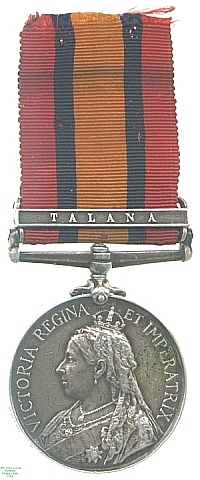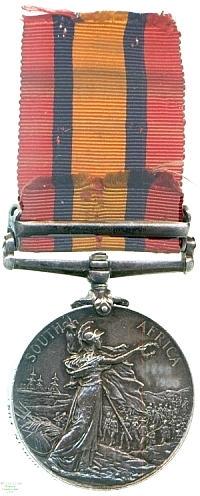
Obverse, a bust of Queen Victoria with veil

Reverse, Britannia in the foreground facing right holding a standard and waving a wreath over an army marching along the shore, with ships offshore in the background

Obverse, a bust of Queen Victoria with veil |

Reverse, Britannia in the foreground facing right holding a standard and waving a wreath over an army marching along the shore, with ships offshore in the background |
During the 1830s and 1840s several Dutch republics had been established outside the British Cape Colony in South Africa, among which were Transvaal and the Orange Free State, all now in modern South Africa. Transvaal was annexed briefly by the British but its independence re-established in the First Boer War.
In the 1880s however the discovery of vast gold reserves in Transvaal brought large numbers of foreign settlers, largely British, across the border, and an attempted coup at the instigation of Cecil Rhodes in 1895. Military escalation followed, negotiations failed and the two Boer republics, convinced that the British intended annexation, declared war in the Cape Colony in October 1899.
Boer troops immediately invaded the British provinces of Natal and the Cape Colony. Natal, at this time less urbanised than the Cape, did not give rise to such famous sieges as those further west but it did give rise to the first set-piece battle of the War, at Talana Hill on 20 October 1899, in which a British garrison at Dundee was surrounded by Boer units and forced its way through them by direct and costly frontal assault. This type of engagement, in which Imperial troops sustained far higher casualties than the Boers but the Boers, being willing to sustain fewer, abandoned the field nonetheless, would become typical of the War.
The earliest issues of the medal indicate that the War was not expected to last as long as it did, as they bear the dates 1899-1900 in the reverse field. Very few were issued in this state, but a large number of the first issues show signs of the dates' erasure, often as in this case insufficiently thorough. This medal was awarded to Private J. Sullivan of the Royal Dublin Fusiliers. Lester Watson acquired it at some point before 1928.